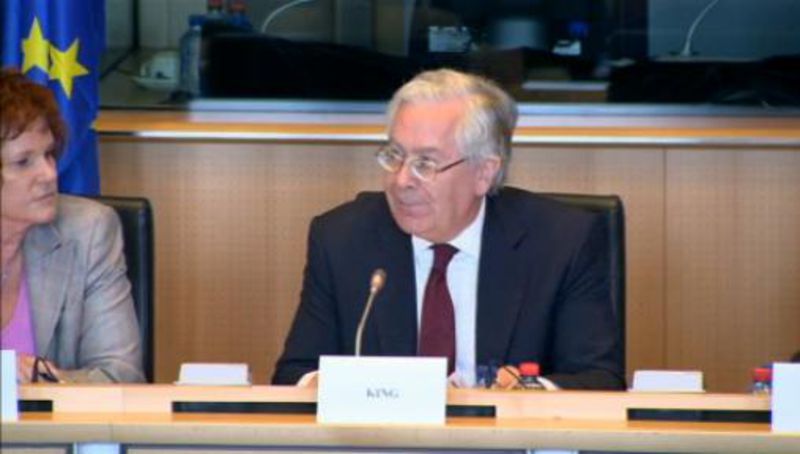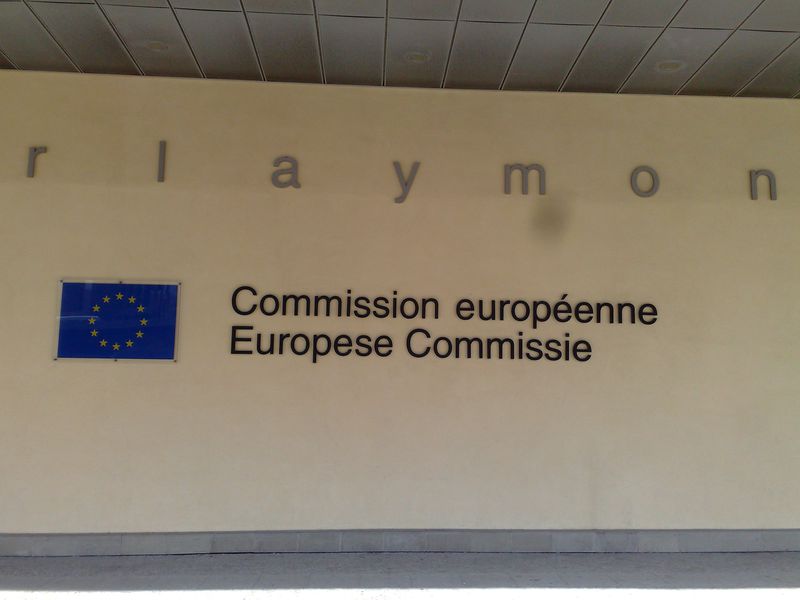The short legs of the budgetary deficit*
Adelina Marini, April 11, 2010
 The general rule says that most important is the news which either concerns a lot of people or has long term consequences, or both. From this point further it is a matter of assessment of each media which news could be most important. When a news is in the first category, which is - concerns a lot of people and has long-term consequences - it is very important how and by whom it will be announced. Because it is important that the people will understand it correctly, that they will be aware that the problem is diagnosed and that work on its solution has started.
The general rule says that most important is the news which either concerns a lot of people or has long term consequences, or both. From this point further it is a matter of assessment of each media which news could be most important. When a news is in the first category, which is - concerns a lot of people and has long-term consequences - it is very important how and by whom it will be announced. Because it is important that the people will understand it correctly, that they will be aware that the problem is diagnosed and that work on its solution has started.
But this usually happens in states where people know what media are for and where media know very well who they serve to (in order to avoid any confusion - the main purpose of media is to serve to the citizens, to inform them and look for responsibility and information from the institutions on behalf of the people).
It was Friday - the last day of the short week after Easter. A day when in the media offices the usual planning of next week is taking place, as well as the topics of the current day. This is what we were doing too until 1019. Then we got the E-mail, inviting media to attend a press conference in the Ministry of Finance.
Something in this e-mail suggested panic yet in the subject: "MF-press conference of minister Dyankov!" And the e-mail itself said literally the following: "The deputy prime minister and minister of finance Simeon Dyankov will give a press conference on budget issues at 12.00 today in the "College" hall of the Ministry of Finance". Does anything bother you in the invitation?
We, the team of euinside, were worried by the following: first of all the topic about the budget is extremely a serious one and is usually predictable - we know when the budget is being planned, when it is discussed, when it is voted in Parliament, there are deadlines, there is a Law for the Budget. In other words the subject "Budget" does not require media to be called in 1020 to attend a press conference in 12 o'clock the same day. The second thing that worried us was the reluctance of the Ministry of Finance to elaborate further - what does the subject Budget mean, what's wrong with the budget, has anything happened, what could have happened that can be so urgent? And other similar questions.
In midday a large group of journalist are situated in the small hall for press conferences at the Ministry of Finance. The big waiting commences. 25 minutes later (at 1225) we understand that there will be a joint press conference in the government's building. In the meantime we have received an e-mail from the government information service, telling us that "the prime minister Boyko Borissov will give a press conference on current issues" in 1 o'clock. The message was received, please note, in our inbox in 1212.
Why am I telling you all this, you might ask? In order to explain to you how we get to the most important news, so please, be a little bit more patient because what I am telling you gives me, personally, a clear, although very unpleasant idea how the state is being governed.
So, at the stage we have the prime minister Boyko Borissov, surrounded by his deputy premier and minister of finance Simeon Dyankov and his minister of the economy, energy and tourism Traycho Traykov, who had just returned from a visit in the US, and another 2 people that I don't know. First spoke minister Dyankov who started from far away, telling us how the budget is being made - that by law it is calculated on a cash basis (in other words, assessing the money in the Treasury), and not by Eurostat's methods which is by commitments.
While he was explaining how the budget is being calculated and how it is being assessed in Brussels, a trained ear starts realising that we are going to an admitting of a large budgetary deficit. Before hearing this however, we learn that the previous government concluded annexes to contracts in the end of 2008 and 2009, "which on commitments basis might have negative impact on our budgetary results for 2008-2009".
And here is the most important news - on Thursday, April 8th minister Dyankov informed the European Commission and the European Central Bank, as well as all his colleagues from ECOFIN that Bulgaria will voluntarily start a revision of its budgets for 2008-2009 on a commitments basis. "In order to be honest to all Bulgarians and our European partners, we have decided to voluntarily present this information immediately, so that we can be as transparent as possible, unlike the previous government, and to inform everyone what on a commitments basis was the situation of the budgets for 2008 and 2009", the deputy prime minister added.
This means that on a commitments basis, according to preliminary data, the  budgetary deficit for 2009 will jump from 1.9% to 3.7%. The news is shocking! Not because of its essence but because of the many questions it raises but to which there is still no answer. Like why minister Dyankov has decided to calculate the budget on a commitments basis now and not when economists invited him to do in the end of last year? Asked by euinside whether he contributed to the mistake too, Simeon Dyankov responded extremely not understandable:
budgetary deficit for 2009 will jump from 1.9% to 3.7%. The news is shocking! Not because of its essence but because of the many questions it raises but to which there is still no answer. Like why minister Dyankov has decided to calculate the budget on a commitments basis now and not when economists invited him to do in the end of last year? Asked by euinside whether he contributed to the mistake too, Simeon Dyankov responded extremely not understandable:
"On the contrary, the latest data this information shows that our and my personal, and the overall decision of the government in the last several months of 2009 for us to tighten the belts and not continue the previous practice of the previous government of spending, show us that this was the right policy. We did, of course, calculations on a commitment basis and on a cash basis, so we had these calculations back then too. What we see now however, is that with all calculations, in fact the reports and Budget 2009 in general, that were made on the basis of the third quarter, the report I received. It said that against the backdrop of all the information from all ministries, if there were any not financed, out of budget spending, it might reach 14 mn levs (7.17 mn euro)".
 It was here when the prime minister Boyko Borissov interrupted his finance minister, adding: "Dyankov's mistake was that he did not wipe them out when he went there and left all those people that give numbers and calculations that they like, and not the real ones. This is his mistake. This succession, this tolerance we demonstrated the first months did not repay us with good in any way. The people who had to come and tell us - look, it's good that you leave us here, and not fire us, we have no plan, but you should know that this is what you have hidden in the backyard, which will come up in the next months".
It was here when the prime minister Boyko Borissov interrupted his finance minister, adding: "Dyankov's mistake was that he did not wipe them out when he went there and left all those people that give numbers and calculations that they like, and not the real ones. This is his mistake. This succession, this tolerance we demonstrated the first months did not repay us with good in any way. The people who had to come and tell us - look, it's good that you leave us here, and not fire us, we have no plan, but you should know that this is what you have hidden in the backyard, which will come up in the next months".
If you understood nothing, let me tell you - minister Dyankov had been receiving false reports about the implementation of Budget 2009 on a quarterly basis. It was difficult to clarify the numerous questions this news raised because the press conference was also about energy and gathered together financial and energy reporters who, on their behalf, wanted to know what will happen to the energy distributing companies and to get more information on many other very important issues in the energy sector. So, we had to try and understand how is it possible annexes to contracts worth millions and billions of levs to remain in drawers, according to the prime minster - deliberately hidden - through questions about what will happen to the Bulgarian Energy Holding, how will the state sell its minority shares in the energy distributing companies, will this influence the price of the electricity and so on.
What we learned was that all these newly appeared annexes were sent to the general prosecutor's office. But this also means that if these annexes are the reason for the new data about the budgetary deficit, if we are to wait for the general prosecutor's position, then this information cannot be confirmed. How then are we informing the European Commission? In an attempt to get an answer euinside had to chase minister Dyankov who said only that the information, sent to the European Commission, was certain and correct.
And the prime minister explained that these annexes were deliberately hidden by civil servants from the second and third echelon of the ministries. He did not say which ministries, whether he would fire these servants, how many people are we talking about, why not firing them? He did not say also whether there was anything wrong with the way the state administration is keeping track of all the commitments it makes, since it is possible a third echelon servant to keep annexes to contracts worth millions in his drawer together with the nail polish and his breakfast.
In case you've remained stunned after reading the text so far, as we felt, here's an attempt of euinside to explain what actually the government announced at noon on Friday, April 9.
In the end of the month it is expected the Eurostat to present the spring data, from which it will probably become clear that Bulgaria ended 2009 with an excessive deficit - this is budgetary deficit that excesses 3% of GDP as written in the Stability and Growth Pact, which controls the financial policy of EU member states and those in the euro area. When the 3% barrier is being trespassed, the European Commission opens excessive deficit procedures which are supposed to end with fines for the member states that has violated it. This measure, however, has not been imposed so far. Minister Dyankov explained that a procedure will most certainly be opened.
The question is how the European Commission will react and also the ECOFIN (the Council of the EU ministers of finance) and the European Central Bank. Because, in fact, it does not matter who is to be blamed that the data Bulgaria presented so far were, to put it mildly, not precise. This will be another blow for the European Union which still has not tackled the problem with Greece. This will be a blow against Bulgaria too because it will add more uncertainty to the financial stability of the country. Especially when the government is amusing the media and the general prosecutor's office with hard to prove allegations, instead of thinking how to increase the revenues in the budget. For this year, minister Dyankov assured, there won't be any problems with the budget.
The anti crisis measures, which the government painfully negotiated recently, again in absolute darkness and urgent calling of press conferences, will be left to deliver results, the prime minister said. New measures will not be negotiated. According to the economists with which euinside spoke on Friday afternoon, the greater problem is not past spending but the current expesnes for which the money in the Treasury will end quite soon. And then?
*This is a game of words with e national saying which says that a lie has short legs, meaning that sooner or later the truth comes up
 | © European Union
| © European Union | © European Union
| © European Union | © European Union
| © European Union | © euinside
| © euinside | © euinside
| © euinside | © euinside
| © euinside